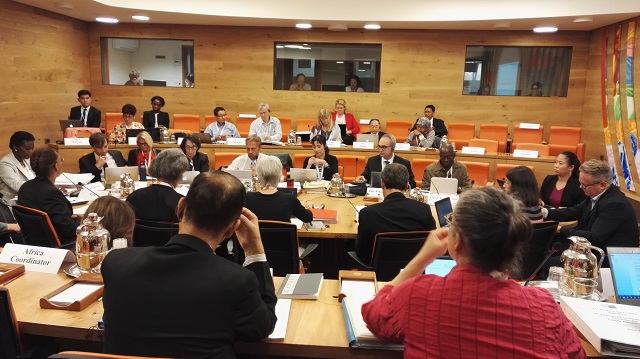Codex Executive Committee concludes 71st Session

The Executive Committee of the Codex Alimentarius Commission met in Rome this week at FAO Headquarters.
This committee is tasked with strategic planning and programming. It is also responsible for carrying out a critical review of the standards proposed by Codex committees to the Commission for adoption. The review is non technical and guarantees that proposals to undertake work are based on priorities and needs. Full details of the standards to be discussed are available here under agenda items 3-7.
The Executive Committee also monitors progress in developing standards and can advise on any corrective action it believes a particular body or committee should take.
Antimicrobial Resistance - AMR
The Executive Committee will recommend to the Commission next week that a Task Force be established on AMR. This work will be carried out in coordination with FAO, WHO and OIE in order to ensure consistency and the highest possible levels of collaboration. There was a strong agreement in the Executive Committee that Codex needs to maintain its leadership on such a dynamic and evolving issue. Both FAO and WHO will be lending their full support to the process at strategic and technical levels.
Strategic Plan
It will also be the task of the Executive Committee, once work is approved by the Commission, to begin discussing the next strategic plan in Codex (from 2020-2025). The work will involve all Codex regions who provide invaluable input on food safety and quality issues from a local perspective and are ideally placed to bring emerging issues to the attention of the Commission.
The process will be developed by the Codex Secretariat with the Codex Chairperson and Vice-Chairs entrusted with preparing the groundwork for the project.
The full report of the meeting is avilable online here.
Who sits on the Executive Committee
The Executive Committee is made up of a Chairperson, 3 Vice Chairs, Coordinators from seven geographical regions and seven other members elected on a geographical basis.
Photo credit: Mirko Montuori
At the heart of the Codex mandate are the core values of collaboration, inclusiveness, consensus building and transparency. Governmental and non-governmental, public and private organizations alike play a vital role in ensuring Codex texts are of the highest quality and based on sound science.
Codex would have little authority in the field of international standard setting if it did not welcome and acknowledge the valuable contributions made by observers. Expert technical bodies, industry and consumer associations
contribute to the standard-setting process in a spirit of openness, collaboration and transparency.
Intergovernmental organizations (IGOs) and international non-governmental organizations (NGOs) can apply for observer status in Codex in order to attend and put forward their views at every stage of the standard-setting process.
 Current Codex Alimentarius Commission
Current Codex Alimentarius Commission
Codex Executive Committee concludes 71st Session

The Executive Committee of the Codex Alimentarius Commission met in Rome this week at FAO Headquarters.
This committee is tasked with strategic planning and programming. It is also responsible for carrying out a critical review of the standards proposed by Codex committees to the Commission for adoption. The review is non technical and guarantees that proposals to undertake work are based on priorities and needs. Full details of the standards to be discussed are available here under agenda items 3-7.
The Executive Committee also monitors progress in developing standards and can advise on any corrective action it believes a particular body or committee should take.
Antimicrobial Resistance - AMR
The Executive Committee will recommend to the Commission next week that a Task Force be established on AMR. This work will be carried out in coordination with FAO, WHO and OIE in order to ensure consistency and the highest possible levels of collaboration. There was a strong agreement in the Executive Committee that Codex needs to maintain its leadership on such a dynamic and evolving issue. Both FAO and WHO will be lending their full support to the process at strategic and technical levels.
Strategic Plan
It will also be the task of the Executive Committee, once work is approved by the Commission, to begin discussing the next strategic plan in Codex (from 2020-2025). The work will involve all Codex regions who provide invaluable input on food safety and quality issues from a local perspective and are ideally placed to bring emerging issues to the attention of the Commission.
The process will be developed by the Codex Secretariat with the Codex Chairperson and Vice-Chairs entrusted with preparing the groundwork for the project.
The full report of the meeting is avilable online here.
Who sits on the Executive Committee
The Executive Committee is made up of a Chairperson, 3 Vice Chairs, Coordinators from seven geographical regions and seven other members elected on a geographical basis.
Photo credit: Mirko Montuori
 Codex and Observer
Codex and Observer
around the world since ancient times.
We might not always know where it comes from,
but we expect it to be available, safe and of good quality.









Leave a comment